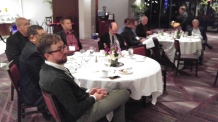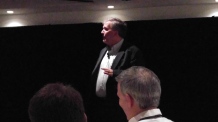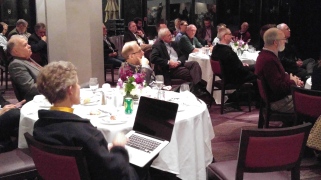 The Faculty Retreat for the Oikonomia network opened this evening at the Sheraton Gateway, LAX. The retreat serves as a
The Faculty Retreat for the Oikonomia network opened this evening at the Sheraton Gateway, LAX. The retreat serves as a  one day precursor to the Karam Forum that follows. Greg Forster greeted visiting faculty and noted that the focus of the retreat revolves around the question “What is the Economic Responsibility of the Church?” Forster observed that often questions of faith, work, and economics begin and end in the
one day precursor to the Karam Forum that follows. Greg Forster greeted visiting faculty and noted that the focus of the retreat revolves around the question “What is the Economic Responsibility of the Church?” Forster observed that often questions of faith, work, and economics begin and end in the  practical life of the congregation. So, this year’s retreat hopes to raise questions about the church’s life and engagement with our current economic realities.
practical life of the congregation. So, this year’s retreat hopes to raise questions about the church’s life and engagement with our current economic realities.
 To orient the faculty to the theme, Forster introduced Dr. L. Gregory Jones from Duke Divinity School and Duke University. Dr. Jones has served both as the Dean of Duke Divinity and
To orient the faculty to the theme, Forster introduced Dr. L. Gregory Jones from Duke Divinity School and Duke University. Dr. Jones has served both as the Dean of Duke Divinity and  Provost at Baylor University before returning to Duke to teach and serve as senior fellow the Center for Faith and Leadership. Dr. Jones provided a stimulating presentation on “traditioned innovation” which is also the theme of his recent book Christian Social Innovation: Renewing Wesleyan Witness.
Provost at Baylor University before returning to Duke to teach and serve as senior fellow the Center for Faith and Leadership. Dr. Jones provided a stimulating presentation on “traditioned innovation” which is also the theme of his recent book Christian Social Innovation: Renewing Wesleyan Witness.
Jones opened by noting the challenges of ministry in the midst of our “secular age” (noting Charles Taylor’s theme). He then related it to the book of Numbers which is also known in the Jewish tradition as  “in the wilderness.” Focusing on Numbers 10-21 as a chiasmus treatise, Jones notes the passages converges from general complaining to a struggle for basic needs, to the challenge of leadership (and conflict of leadership), and finally, to the heart of the story: the sojourn of the 12 spies into Canan. At the center of the overall passage, Jones notes the scriptures reveal at this juncture Israel’s fear and
“in the wilderness.” Focusing on Numbers 10-21 as a chiasmus treatise, Jones notes the passages converges from general complaining to a struggle for basic needs, to the challenge of leadership (and conflict of leadership), and finally, to the heart of the story: the sojourn of the 12 spies into Canan. At the center of the overall passage, Jones notes the scriptures reveal at this juncture Israel’s fear and  failure to enter a new challenge, and even desire to return to Egypt. Jones quips that every church (and seminary) seems to possess a “back to Egypt” committee of seeking a return to a falsely remember “better day.” Jones observes the real sin of Israel is not the desire to return but the “death wish,” a death of imagination. Rather than see Cana with new purpose, a new witness to the vision of the KOG, they see only traditionalism as the response.
failure to enter a new challenge, and even desire to return to Egypt. Jones quips that every church (and seminary) seems to possess a “back to Egypt” committee of seeking a return to a falsely remember “better day.” Jones observes the real sin of Israel is not the desire to return but the “death wish,” a death of imagination. Rather than see Cana with new purpose, a new witness to the vision of the KOG, they see only traditionalism as the response.
Jones noted the same challenge to Theological Education and the church today.  Theological educators tend to engage in a kind of professional navel-gazing around the reduction of resources in seminaries and divinity schools. However, Jones notes that all professional schools (business, law, medicine, education) seem to struggle with the same problems (technology, focus on short-term financial expectations, machine learning, loss of credentialing as a standard for leadership, etc.). Yet, all sections of professional practice, and not just the church, seem to be struggling. Yet this time might be the best of time for the church if we can seize it and respond with innovation anchored in our biblical and historical traditions of God raising up leaders regardless of the model of academic preparation.
Theological educators tend to engage in a kind of professional navel-gazing around the reduction of resources in seminaries and divinity schools. However, Jones notes that all professional schools (business, law, medicine, education) seem to struggle with the same problems (technology, focus on short-term financial expectations, machine learning, loss of credentialing as a standard for leadership, etc.). Yet, all sections of professional practice, and not just the church, seem to be struggling. Yet this time might be the best of time for the church if we can seize it and respond with innovation anchored in our biblical and historical traditions of God raising up leaders regardless of the model of academic preparation.
 Jones called for theological educators to embrace a wider and longer imagination of traditioned innovation. This means that educational institutions need to give up bureaucratic and mechanistic approaches to administration and think of organizations that grow organically and occasionally undergo pruning. Yet innovation, as change, does not mean “making
Jones called for theological educators to embrace a wider and longer imagination of traditioned innovation. This means that educational institutions need to give up bureaucratic and mechanistic approaches to administration and think of organizations that grow organically and occasionally undergo pruning. Yet innovation, as change, does not mean “making  things up” as we reject the past. Instead, we need to curate and retain that from the tradition that gives life while we also move forward with a vision shaped by our vision of the Kingdom of God. This combination of “core and creativity” comes as the people live intimate lives together, share stories, and work together. This same form of traditioned innovation allows for encouraging an entrepreneurial mindset, but one also drawn from the traditions and shared practices. Thinking about the rise of thinking machines, Jones noted Geoff Colvin’s book Humans Are Underrated. In the book, Colvin argues that there are three things machines will not replace that humans display: empathy, teamwork, and storytelling. Jones notes these three things often appear in and through the work of the church.
things up” as we reject the past. Instead, we need to curate and retain that from the tradition that gives life while we also move forward with a vision shaped by our vision of the Kingdom of God. This combination of “core and creativity” comes as the people live intimate lives together, share stories, and work together. This same form of traditioned innovation allows for encouraging an entrepreneurial mindset, but one also drawn from the traditions and shared practices. Thinking about the rise of thinking machines, Jones noted Geoff Colvin’s book Humans Are Underrated. In the book, Colvin argues that there are three things machines will not replace that humans display: empathy, teamwork, and storytelling. Jones notes these three things often appear in and through the work of the church.
 Following Jones’ presentation. Christianity Today editor and author Andy Crouch joined him for a question and answer session. Andy asked Jones what were the resources of tradition that would provide the basis for innovation for churches and seminaries in our world today. Jones offered three resources. First, we have a long history of Christian communities who have demonstrated incredible innovation during difficult times. We can draw from their stories. Second, Christians possess a deeply theological view of what it means to be human that differs greatly from the general world, giving us an opportunity reflect the optimism of grace but also our common humanity together. Finally, seminaries have a much deeper educational history than most of the professional traditions. The church can go back to Origen and Augustine to find examples of educating for “practical wisdom” needed for thoughtful innovation today. Ultimately Jones argued that the theological education must explore and tell the
Following Jones’ presentation. Christianity Today editor and author Andy Crouch joined him for a question and answer session. Andy asked Jones what were the resources of tradition that would provide the basis for innovation for churches and seminaries in our world today. Jones offered three resources. First, we have a long history of Christian communities who have demonstrated incredible innovation during difficult times. We can draw from their stories. Second, Christians possess a deeply theological view of what it means to be human that differs greatly from the general world, giving us an opportunity reflect the optimism of grace but also our common humanity together. Finally, seminaries have a much deeper educational history than most of the professional traditions. The church can go back to Origen and Augustine to find examples of educating for “practical wisdom” needed for thoughtful innovation today. Ultimately Jones argued that the theological education must explore and tell the  story of innovation and entrepreneurship in Christian ways so that it becomes understandable for those in the church who need to see the connection between entrepreneurship and the traditioned innovation of our Christian tradition. Ultimately we must move from a “we can’t because” mentality to “we can, if…” in fostering innovation in the church. Quoting Burundi Christian Maggy Barankitse, Jones concluded with a prayer this African social innovator prays daily:
story of innovation and entrepreneurship in Christian ways so that it becomes understandable for those in the church who need to see the connection between entrepreneurship and the traditioned innovation of our Christian tradition. Ultimately we must move from a “we can’t because” mentality to “we can, if…” in fostering innovation in the church. Quoting Burundi Christian Maggy Barankitse, Jones concluded with a prayer this African social innovator prays daily:
“Lord, let your miracles break through every day and
Do not let me be an obstacle in any way”
A fitting prayer for a stimulating opening presentation. May educators and the church learn to pray this prayer in a what that shapes its life for the sake of God’s gracious future.

